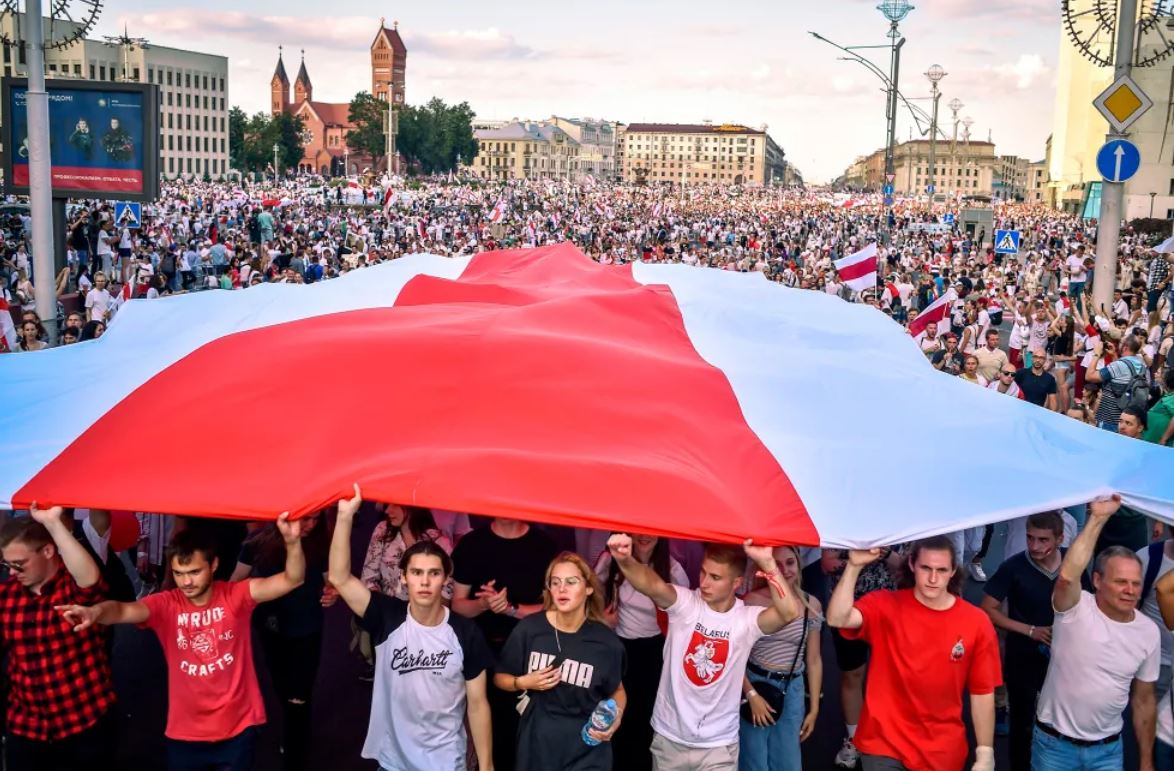RA’s Daily Russia News Blast – August 17, 2020

Today in Russia: Largest protest in Belarus’ history as 200k march on Minsk, Lukashenko defiant and says he asked Russia for help; Tikhanovskaya says she is ready to be “national leader” in Belarus; How Russia could be drawn into Belarus; Payments for doctors may be extended; WeWork will sell offices in Moscow; The fight against sanctioned products to be ramped up
The news in Russia continues to be dominated by events taking place in neighboring Belarus. Strongman Alexander Lukashenko says he asked Vladimir Putin for assistance as 200 thousand demonstrators [in Russian] gathered in Minsk as well as across other cities in the country. Lukashenko also held his own rally where he vowed not to “give away” the country even after his own death, but it was considerably smaller and enveloped by the masses of protesters surrounding it. In addition, protesters rallied outside the Belorussian embassy in Moscow for the eighth straight day.
Lukashenko remains defiant, rejecting demands for a re-run of the August 9 vote and claiming that Putin accepted his request for security assistance. While Russia has not made any public statements regarding its potential response to unrest in Belarus, foreign ministry spokeswoman Maria Zakharova blasted French President Emmanuel Macron for “hypocrisy” in calling for an EU response to protests in Belarus.
Former presidential candidate of Belarus Svetlana Tikhanovskaya said she was ready to become the country’s national leader [in Russian]. In her video message, she noted that as a leader she is ready to release all political prisoners, prepare the legislative framework and all conditions for organizing new presidential elections in the country.“We all want to get out of this endless circle, in which we found ourselves 26 years ago,” said Ms. Tikhanovskaya.
Meduza wrote about Russia’s treaty obligations and the ways in which it could respond to Lukashenko’s request for assistance through the Union State Treaty:
In the past two days, on August 14 and 15, Alexander Lukashenko has spoken twice to Vladimir Putin about the unrest in Belarus. Lukashenko said Saturday’s conversation was “lengthy and exhaustive,” adding that he was “somewhat surprised” that Putin seemed to be “completely aware of what is happening.” The Putin administration hasn’t commented in any detail about the phone calls, but the Kremlin’s official website has published readouts indicating Russia’s readiness to “provide the necessary assistance in resolving problems [in Belaurs] on the basis of the Union State Treaty and, if necessary, through the Collective Security Treaty Organization.”
Putin’s unwillingness to intervene in Belarus may present an opportunity for the West, according to analyst Anna Arutunya:
In the spring of 2006, I was dispatched as a reporter for The Moscow News to cover the presidential elections in Belarus — and the mounting protests against the incumbent Alexander Lukashenko.
The demonstrations came on the heels of two pro-Western color revolutions in Ukraine and Georgia the previous year, and there was a great deal of naive hope, particularly in the West, that popular demonstrations could easily and bloodlessly topple a dictator. I was pessimistic, and after I filed my dispatch, titled “Belarus: Too Soon for ‘Blue’ Revolution,” my skepticism was vindicated. The protests were brutally suppressed, there was global and domestic condemnation, but Lukashenko’s regime survived.
Now, the time has come, largely through Lukashenko’s own undoing, but also, in part, thanks to a perfect storm of the pandemic, a stagnating economy, and Moscow’s growing weariness with subsidizing Belarus and playing cat and mouse with an ally turned frenemy.
Emergency payments to doctors may be extended, Kommersant wrote [in Russian]. “The Russian government will propose to President Vladimir Putin to continue a stimulating policy towards medical workers who are fighting the coronavirus, Prime Minister Mikhail Mishustin said during a visit to Magadan. The prime minister added that regional allowances for doctors will continue to be paid until December.“
WeWork will sell its offices in Moscow, Vedomosti reported. “WeWork began looking for a buyer for its operating business in Russia: the company is negotiating the assignment of lease rights for all of its premises in Moscow with several large networks of coworking spaces and flexible offices. One of WeWork’s partners, two potential bidders for its assets and three consultants who worked with different parties to the negotiations, told Vedomosti about this.” The buyer will have rights to the WeWork brand in Russia.
Rosselkhoznadzor, the Federal Service for Veterinary and Phytosanitary Surveillance called for increased vigilance [in Russian] and more stringent measures against the import of sanctioned goods. “The preparedness of smugglers has become much higher, and it is possible to overcome this when each carrier [transport company] understands that if he undertakes to transport illegal products, his car and goods can be confiscated,” the head of the agency Sergei Dankvert said, in reference to the illegal import of sanctioned cheeses and other products slapped with sanctions in response to Western measures against Russia.
PHOTO: Minsk is rocked by the largest protests in Belarus’ history. Strongman Alexander Lukashenko remains defiant as he clings to power (Sergei Ganon / AFP / Scanpix / LETA).











